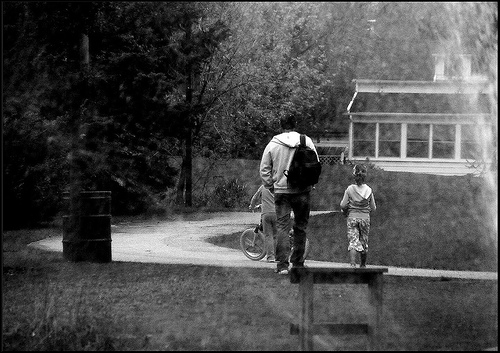
Back to Richard Wilbur, and the thin volume of more recent poems that sits atop my bookshelf, "Mayflies".
This was the first poem I heard Wilbur read:
"A Barred Owl" by Richard Wilbur
The warping night-air having brought the boom
Of an owl's voice into her darkened room,
We tell the wakened child that all she heard
Was an odd question from a forest bird,
Asking of us, if rightly listened to,
"Who cooks for you?" and then "Who cooks for you?"
Words, which can make our terrors bravely clear,
Can also thus domesticate a fear,
And send a small child back to sleep at night
Not listening for the sound of stealthy flight
Or dreaming of some small thing in a claw
Borne up to some dark branch and eaten raw.
Two observations:
1. There is a beauty here in the means a parent has to console a child. In the urban setting of Manhattan, when a child was frightened by the enormous sound of a truck's horn at night, I said we could imagine it was a ship's horn at night in the fog and a story about that ship and where it was sailing brought consolation and sleep.
2. As I look at Wilbur's poetry against his mentor Robert Frost, I think that both are masters of observing the beauty and personality of natural things. Frost is probably more in tune with introspection as he relates to natural beauty, while Wilbur brings the realm of natural beauty to bear in human relationships. I'm not sure, but I think that Wilbur is sort of better with people as I read his poems.
If I were to draw a line from Frost's beliefs to his poetry, it is that he did not experience the love of God personally. He stated he feared but did not know God in a 1947 letter to a friend: "My fear of God has settled down into a deep and inward fear that my best offering may not prove acceptable in his sight."
In interviews Wilbur has identified himself as a Christian but not as one who writes poetry on matters of doctrine (much) as did, for example, TS Eliot in his later work. But it is interesting that the affection that Wilbur has for the material world is often linked with the depth of human relationships amidst the beauty of the world.
I don't say Frost or Wilbur couldn't have written another way, but they do notice different things from the same New England landscapes. It makes me wonder if the different worldviews, thoughts on eternity, and views of God by these two connected poets is significant to that.
What do you think? Any Frost fans out there?
